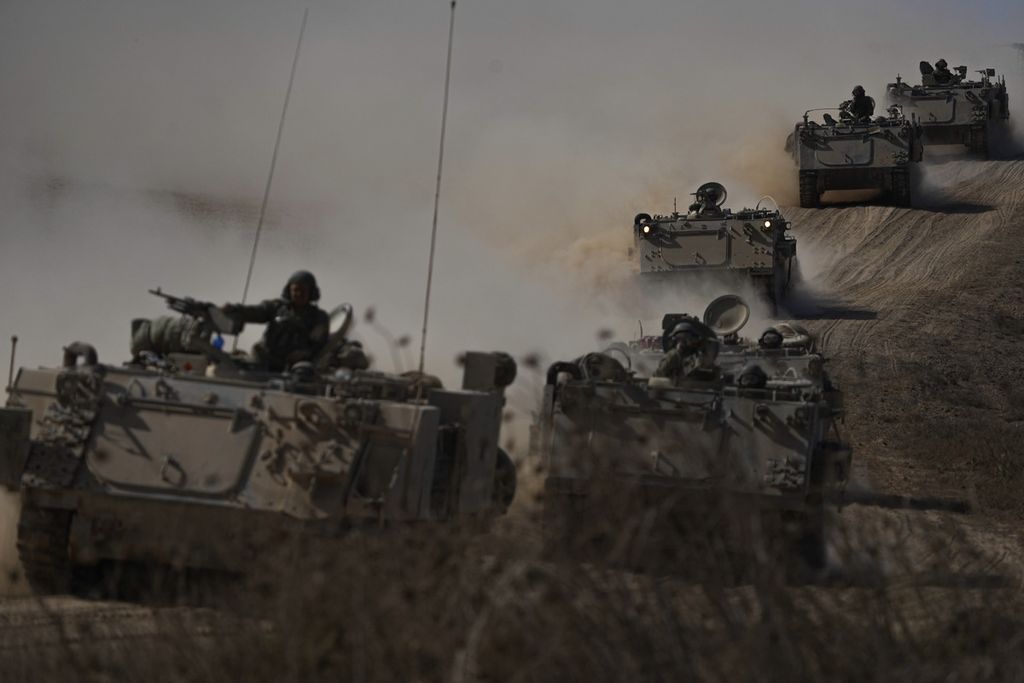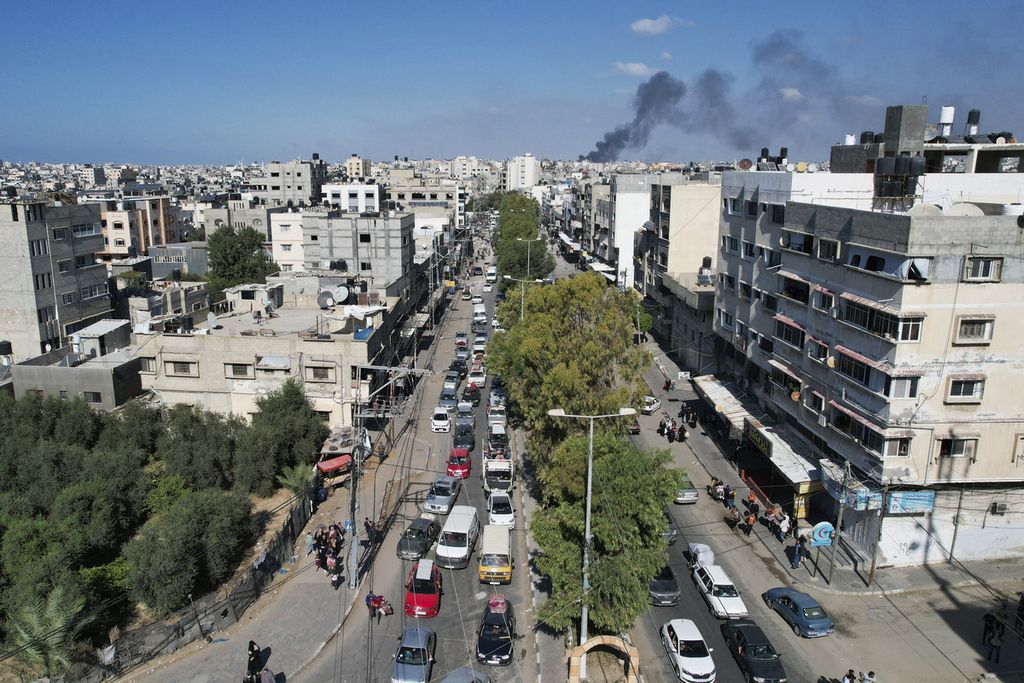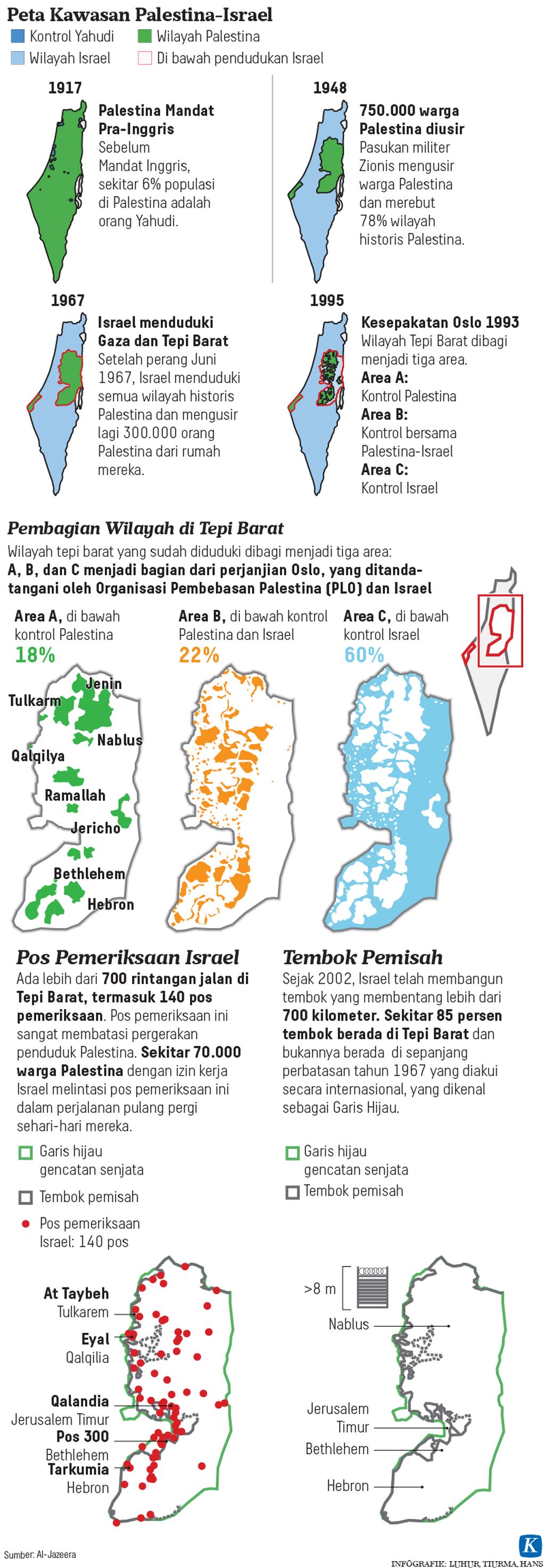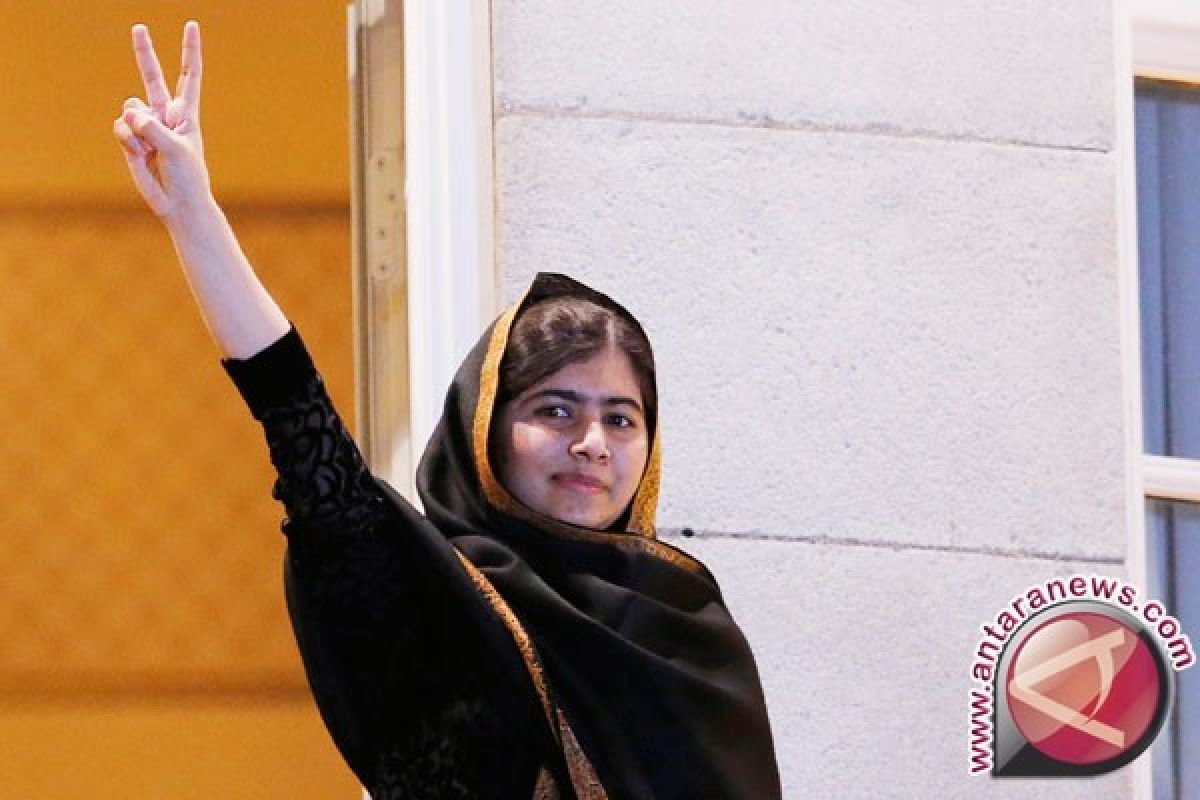They were dispersed to neighboring Arab countries as refugees. Some of them and their descendants still benefit from refugee status today. They still live today in refugee camps in Arab countries.
In a telephone conversation with Canadian Prime Minister Justin Trudeau, Friday (10/13/2023), quoted by the news agency WAFA, Palestinian President Mahmoud Abbas stressed his rejection of Israel’s decision to give the Palestinians an ultimatum to leave northern Gaza. “Because this will be the next Nakba for the Palestinian people,” Abbas said.
Also read: Gaza residents are trapped, there is no way out after Israel’s ultimatum
On Friday morning, the Israeli army issued an ultimatum to civilians in Gaza City, home to more than a million residents, to be evacuated to the southern Gaza Strip within 24 hours. Before the ultimatum was issued, due to days of bombardment from Israeli airstrikes in response to Hamas attacks in Israel’s southern region, on Saturday (07/10/2023), hundreds of thousands of residents of Gaza had fled their homes.
Criticism of Israel’s ultimatum came from various quarters. “Civilians must be protected. “We do not want a mass exodus of Gazans,” said Stéphane Dujarric, UN spokesperson.
Palestinians fled the northern region to the southern Gaza region on Friday (10/13/2023) after the Israeli military issued an ultimatum to civilians to leave the northern Gaza region, signaling the possibility that Israel launches ground attack. on Gaza.
Egyptian President Abdel Fattah el-Sisi and Jordanian King Abdullah II have made their voices heard louder. Egypt is the only Arab country directly bordering Gaza. Jordan borders directly on the West Bank, occupied by Israel.
“This is the root of all problems, a problem for the entire Arab nation,” President Sissi stressed on Thursday (10/12/2023). “It is important that the (Palestinian) people remain strong and defend their land.”
In Sisi’s eyes, if there is a mass exodus of Palestinians from Gaza, especially if the territory is subsequently reoccupied by Israel, this will further reduce the chances of establishing a Palestinian state in the future. The Palestinian people have long dreamed of an independent state on the 1967 border – including the Gaza Strip – with their capital East Jerusalem.
This is the root of all the problems, the problems of the entire Arab nation. (Abdel Fattah el-Sisi)
The statement by King Abdullah II of Jordan was no less harsh. He “rejected any forced attempt by the Palestinian people to leave the entire Palestinian territory or any attempt to provoke their displacement, while calling for the need for preventive measures so that the crisis does not spread to neighboring countries and worsen not the refugee problem.”
Arab League Secretary Ahmed Aboul Gheit also urged UN Secretary-General Antonio Guterres to strongly condemn Israel’s “insane efforts to displace the population.”
Also read: Israel gives citizens ultimatum to leave Gaza City, ground attack draws closer
Saudi Arabia and Kuwait did not lack a single voice to criticize Israel. In a statement from its Foreign Ministry, Saudi Arabia condemned the expulsion of Palestinians from Gaza and attacks against “unprotected civilians”. Riyadh “reiterated its absolute rejection of calls to force the expulsion of Palestinians from Gaza, and its strong condemnation of ongoing attacks targeting unprotected civilians.”
The statement was released just as US Secretary of State Antony Blinken arrived in Riyadh as part of a tour of six Arab countries.
COMPASS
The conflict between Israel and Palestine has lasted 100 years. During this period, the war between the two continues to this day. During this period, the area of Palestine, which was previously controlled by Arab countries, decreased every year. Currently, almost 60 percent of the territory is controlled by Israel. So what will it look like when the Palestinian territory becomes smaller and the majority is controlled by Israel?
Kuwaiti Foreign Minister Sheikh Salem al-Sabah also expressed in a written statement his rejection of Israel’s ultimatum to Gaza residents. Kuwait City also rejects the continued escalation and random destruction that violate international law and humanitarian law.
Al-Azhar University, a respected higher education institution among Sunnis, echoed similar sentiments. “It is better to die a hero and become a martyr in one’s homeland than to surrender to the colonialist usurpers,” Al-Azhar University said, widely disseminated via social media among Palestinians.
“If you leave your homeland, your business and our business will be destroyed forever,” the statement continued.
Also read: Gaza Strip residents imprisoned in hell on Earth
The question of the fate of Palestinian refugees is one of many complex issues in the Palestinian-Israeli peace process. Palestine and Arab countries insist that a peace deal – if negotiated – must include, among other things, the right of refugees and their descendants to return to the areas where they previously lived. Israel has always rejected requests regarding the refugee issue.
Regarding the ultimatum issued to Gaza residents, Israeli Ambassador to the UN Gilad Erdan said the evacuation warning was intended to “temporarily move (residents) south…to mitigate the risk putting civilians in danger.

A convoy of Israeli armored vehicles heads towards the border of the Gaza Strip in southern Israel on Friday (10/13/2023).
“The UN should thank Israel for this warning measure,” Erdan told UN diplomats at an Israeli-hosted event.
A look at the “Nakba”
In 1948, more than 760,000 Palestinians were forced to flee or abandon their lands claimed by the new State of Israel. At that time, the Israeli army had razed more than 400 towns or villages.
The tragedy of the Nakba in 1948 began with demands for territory or land for the Jewish people after the World War II genocide perpetrated by Nazi Germany. At the end of 1947, after years of Jewish immigration, a vote at the UN (Resolution 181) divided the Palestinian territories into two parts: the Arab zone and the Jewish zone.
Also read: Without humanitarian roads, civilians in Gaza are “only waiting for time”
As shown on the page Al Jazeera, Palestine rejects this model of division. The reason was that the Jewish population (about 33 percent), which at the time owned only 6 percent of the territory, received a 56 percent share of the territory, including most of the fertile areas. The rest is destined for Palestine (population 67 percent) which previously controlled 94 percent of the territory.
After the release of the UN resolution, the first wave of exodus of Palestinians began to occur. They were displaced due to fighting between Jewish and Palestinian militias. The exodus intensified after April 1948, when more than 100 Palestinian villagers were killed in Deir Yassin, near Jerusalem, by two Jewish paramilitary groups.
The Israeli army continues to expel Palestinians from the new territories it controls, including the cities of Lod and Ramle in the central region, as well as the Galilee in the north. During Jewish paramilitary operations from 1947 to 1949, more than 500 Palestinian villages, towns and cities were destroyed.
This event is what Palestinians often call the “Nakba” or “catastrophe.” An estimated 15,000 Palestinians were killed.
Jewish paramilitaries control 78 percent of historic Palestine. Meanwhile, the remaining 22 percent is divided into areas currently made up of the occupied West Bank and the Gaza Strip. More than 760,000 Palestinians have been driven from their homes and displaced.
On May 14, 1948, Israel declared its independence. Arab countries responded to Israel’s proclamation of independence by immediately declaring war. In December 1948, the UN adopted Resolution 194 affirming the right of return of Palestinian refugees.
Refugees, among others in the resolution, “who wish to return to their homes of origin and live in peace with their neighbors should be admitted at the most immediately practicable date.” Palestinian refugees who do not claim their property are compensated.
Israel strongly rejects the UN resolution. The reason is that they don’t want Palestinian refugees to return because it could destroy plans to create a Jewish state.
Also read: Palestine ignored in the “Party” between the Arab world and Israel
In 1950, Israel passed the Absentee Property Law. This law emphasizes that all assets of Palestinian or Arab citizens (refugees or living abroad) on Israeli territory are returned to state supervision.
Israel also claims that more than 850,000 Jews were forced to leave Arab countries after Israel’s independence.

Vehicles of Palestinian residents were seen queuing as they fled the northern region to the southern region of Gaza on Friday (10/13/2023), following the Israeli army’s ultimatum to civilians to that they leave the northern region of Gaza.
According to UN data, approximately 5.9 million Palestinian refugees currently live in the West Bank, Gaza Strip, Jordan, Lebanon and Syria. After 75 years of mass exodus during the Nakba, the dream of return of Palestinian refugees remains alive. They commemorate the Nakba every year on May 15.
The story repeats itself
In Gaza, the majority of the population is Palestinian refugees. Many of them are refugees from the same areas that were attacked by the Hamas group on Saturday (07/10/2023). They insist they have the right to return to their country of origin. This wish was categorically rejected by Israel.
Currently, the fear that haunts the Palestinians is the same as that of the leaders of Arab countries: history seems to repeat itself. “We see photos of people who don’t have vehicles, riding donkeys, hungry and walking barefoot, leaving the area as best they can to head south,” said Talal Awkal, a political analyst. who chose to stay in Gaza City.
He chose to stay because he wasn’t sure the southern region was safe. “It is a disaster for the Palestinian people. This is the Nakba,” Awkal said. “They are displacing entire populations from their countries of origin. » (AP/AFP/Reuters)

“Thinker. Hardcore web aficionado. Zombie evangelist. Pop culture trailblazer. Student. Passionate twitter maven.”







